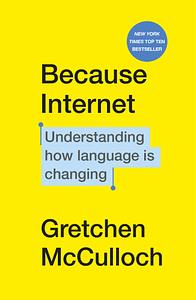You need to sign in or sign up before continuing.
Take a photo of a barcode or cover
This book is pretty great! Get the audiobook version if you want to hear the author pronounce keysmashes - that's pretty great too!
7h 6m
334p
A fascinating look at language and the internet. It goes deep into words, memes, emojis, gifs, generational gaps, and so much more.
334p
A fascinating look at language and the internet. It goes deep into words, memes, emojis, gifs, generational gaps, and so much more.
I thought it was quite long-winded, took me ages to finish. It could have been more to the point.
But I think I'm also finding that non-fiction sciency books just aren't really my genre.
But I think I'm also finding that non-fiction sciency books just aren't really my genre.
interesting bits of internet history, good part about emojis as gestures, but felt as if this slightly meandering book would have been better if it were a longer article. but maybe that's just me.
This book was such a delight to read. Whether you're a linguist, generally fascinated by how we use language, or even under the impression that we need to make 'protect language', this book will speak to you (and if you're the latter, hopefully change your mind). I would recommend this book as a contemporary and fun introduction to linguistics - but am certain I will return to the plethora of examples raised to supplement my own linguistic arguments.
An essential read for Word Nerds, this is a thorough yet compelling and readable sociolinguistic analysis of the history of how people have Done the Internet (and conversation in general).
What I liked most about this book is that it doesn't just explain how language is used and is changing on the internet, but also helps the reader understand language variation and change more broadly. I think when most people talk about internet language it's like looking at animals in a zoo, and commenting on how interesting and weird it is. In this book, the author explains how the variation we're seeing is interesting for sure, but definitely not weird - when we see people "breaking rules" with language on the internet, it's actually not so different from when those same rules were broken previously in a different medium. So, the book manages to simultaneously expose the reader to new linguistic territory, while showing how language has been working all along right under our noses.
I quite enjoyed this linguist's take on the internet's contributions to the ongoing development of the English language. It was fun to see where I fit in on the timeline of internet people and to compare the differences between my place and my kids'. The chapters on the contributions of emoji and memes were probably my favorite parts in the way that they made me examine language in an altogether new way.
funny
informative
look, i'm reading more nonfiction for my new year's resolution!
This is obviously a very well documented linguistic/historical study of the internet. But for someone who grew up on the internet (a Full Internet Person, as McCulloch calls it), most of it isn't new and so reading it felt a little dry for me.
This is obviously a very well documented linguistic/historical study of the internet. But for someone who grew up on the internet (a Full Internet Person, as McCulloch calls it), most of it isn't new and so reading it felt a little dry for me.







